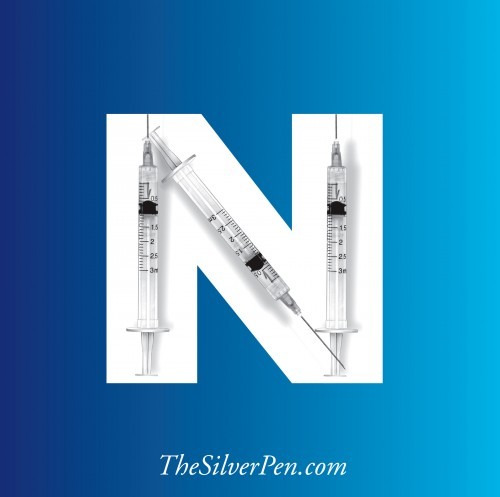When I was in nursing school, I used to ask my fellow student to practice drawing blood on me. I know it sounds sadistic, but my intention was a two-fold Silver Lining:
- I wanted to confront my personal fear of needles. I figured that the more times I was stuck, the more used to it I would become. (Yes, my delusions started way before I was diagnosed with F-bomb breast cancer.)
- I also wanted to know what it felt like when people missed a vein. Yes, that’s right, when people missed. I figured that if I knew what it felt like when people missed (it f-bomb hurts, by the way!), that I would be that much more motivated to become the best blood drawer and IV starter that I could be.
While I was also in nursing school, to acquaint myself with the goings on of life on a hospital unit, I became a phlebotomist. I was the person who rolled in the cart of multi-colored vials and needles to collect blood specimens from (usually sleeping) patients. Ohhhhhh, did I ever dread waking patients to stick them.
The Silver Lining was that because of my laser-like focus and intuition, I was able to whisper in their ears, “I’m really good at this and will get your blood on the first stick.” My favorite interactions were when patients asked, “When are you going to stick me?” and I could say to them, “I’m already done.”
Coping mechanisms for needle phobia:
- Tell the phelebotomist (the person who draw your blood) or your nurse.
- Look away or close your eyes. If you’re frightened, why torture yourself by watching?
- Take deep breaths, especially when the needle punctures your skin.
- Allow a maximum of two sticks per person. Hold your ground. Tell the person, “I have a two-stick maximum policy. I’d like another phelebotomist, please.”
- Request that the phlebotomist uses a “butterfly” needle. It is the smallest needle available and just as effective.
- For especially difficult veins, you can request a topical numbing agent (though not all labs have them).
- Busy your mind by counting backwards from some unreasonable number that will actually make you think, e.g., 1,359,112.
- Don’t chat with the phlebotomist. It is important for the person taking aim at your veins to be fully focused on the task at hand.
I hope that these little tips will be a Silver Lining during your next blood draw!



So love the idea about two sticks per person. Genius way of handling it!!
Jennifer
Thanks, Jennifer! Please remember the butterfly needle as well!
I had needle phobia so bad….from having been sick a lot as a child and some horror stories with injections…..that I delayed checking into that lump in my breast for a few years….yes….years. When I finally had it checked…the initial needle biopsy was awful…confirming my fears. Then the guided “core sample” biopsy was nothing less than my worst nightmare….leaving me traumatized even now…8yrs later. I almost declined surgery because of what I was told about the presurgical injectins for the sentinel nodes. Thanks be that my surgeon at Mayo listened…and agreed to do the injections after I was out from the anasthetic.I was able to overcome my fear eventually….blessed to not need chemo or rads….But I wish the medical establishment would have accepted my fear early on and worked with me to make the diagnostic process less horrific for me. I still cannot talk or write about it without tears…..
I only developed needle phobia after getting bilateral lymphedema in my arms after FBC. Not many people can do foot draws well. I have had such painful experiences, including nerve damage when someone tried a vein by my big toe. I will use some of your hints next time.
Thanks so much. I too like two sticks max rule. Also I would ask for a warm face towel . I put it on my arm for a few minutes it worked like a charm my veins popped up for them.
I have a port now (I highly reccomend especially long term chemo treatment).